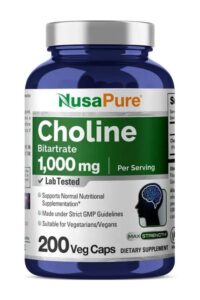
Ever wonder what goes on inside that beautiful baby bump? Millions of cells are dividing, organs are forming, and a tiny brain is rapidly developing. It’s a magical time, filled with excitement and maybe a touch of overwhelm. One crucial nutrient, often overlooked, plays a starring role in this incredible process: choline. Forget the superhero hype, choline during pregnancy is the real deal, laying the foundation for your baby’s brilliant future.
Related: The Benefits of Fennel Seeds During Pregnancy
Why Is Choline During Pregnancy Important?
Forget the superhero hype, choline is the real deal during pregnancy. This B-vitamin-like nutrient plays a starring role in building your baby’s brain, that magnificent control center that will guide them throughout life. Choline acts like a skilled architect, constructing cell membranes – the foundation of brain cells – and supplying the raw materials for neurotransmitters, the brain’s messengers. Think of it as ensuring your baby has a well-built house with a top-notch communication system!
Building a Brainy Baby: How Choline Works Its Magic
Here’s how choline’s superpowers translate into real benefits for your little one:
- Memory Marvel: Studies like the one conducted by Cornell University [Choline During Pregnancy Impacts Children’s Sustained Attention] suggest that adequate choline intake during pregnancy can lead to improved memory and information processing in children. Imagine your child excelling in school and retaining information with ease – a gift that keeps on giving!
- Cognitive Champion: Choline also contributes to cognitive function, which encompasses various mental skills like learning, problem-solving, and critical thinking. By ensuring your baby gets enough choline, you’re giving them a head start in these crucial areas.
- Sharpening the Focus: Research suggests choline may play a role in attention and focus. Think of it as equipping your child with the ability to concentrate and learn effectively – a valuable asset in a world filled with distractions.
- Potential Neuroprotection: Some studies hint at choline’s potential to offer neuroprotective benefits, safeguarding your baby’s developing brain from potential future challenges.
Related: Can You Eat Chicken Salad While Pregnant?
Beyond the Brain: Choline’s Other Pregnancy Perks
While brain development is choline’s crowning achievement, its benefits extend beyond the noggin:
- Neural Tube Defense: Neural tube defects (NTDs) are birth defects affecting the brain and spinal cord. While folic acid is a well-known NTD preventative, research suggests choline may also play a role [Sample Records For Severe Neural Tube Defects].
- Stress Less, Mama!: Preliminary research suggests choline might even help regulate stress response in babies, potentially leading to calmer, more adaptable little ones.
- Birth Weight Boost: Some studies indicate a possible link between adequate choline intake and a healthy birth weight.
How Much Choline Do You Need? Aiming for the Sweet Spot
The current recommended daily choline intake for pregnant women is 450mg. But guess what? Most women fall short! Don’t worry, we’ll tackle how to bridge that gap in a bit.
Related: Can You Safely Eat Takis While Pregnant?
Food Glorious Food: Choline-Rich Powerhouses
Let’s get this dietary party started! Here are some choline superstars to add to your pregnancy plate:
- Eggs: They’re not just for breakfast anymore! Egg yolks are a fantastic source of choline.
- Liver: This powerhouse packs a choline punch, but remember, moderation is key due to its high vitamin A content.
- Fish: Fatty fish like salmon, tuna, and sardines are swimming with choline goodness.
- Chicken and Beef: Lean cuts of these meats offer a decent amount of choline.
- Dairy Delights: Milk, cheese, and yogurt contribute to your daily choline intake.
- Legume Love: Beans and lentils are vegetarian choline champions.
- Nutty Goodness: Almonds, cashews, and peanuts are healthy snacks loaded with choline.
- Cruciferous Companions: Broccoli, cauliflower, and Brussels sprouts add a choline boost to your veggie repertoire.
Related: 16 Foods That Are High In Choline
When To Start Taking Choline During Pregnancy?

Ideally, you should start taking choline before conception, along with folic acid, another essential nutrient for pregnant women. This is because fetal brain development begins very early in pregnancy.
At the very latest, you should aim to incorporate choline into your diet or start a supplement regimen in the early- to mid-second trimester. This will ensure your baby gets the most benefit from choline during critical development stages.
How Long To Take Choline During Pregnancy?
The recommended duration for taking choline during pregnancy is throughout your entire pregnancy, not just a specific trimester. Here’s the breakdown as discussed above:
- Ideally: Start before conception and continue throughout pregnancy.
- Minimum recommendation: Begin in the early- to mid-second trimester and continue pregnancy-long.
There’s no evidence suggesting stopping choline intake is beneficial after the second trimester. Maintaining a sufficient choline level throughout pregnancy is considered best for fetal development.
Here are some additional points to consider:
- Breastfeeding: If you plan to breastfeed, choline needs actually increase slightly. The recommended daily intake goes up to 550mg during lactation.
- Dosage: The recommended daily dosage for choline during pregnancy is 450mg. It’s always best to discuss the appropriate dosage with your doctor, especially if you’re taking prenatal vitamins that already contain choline.
Remember, consulting a healthcare professional is always recommended to determine the best course of action for your specific situation.
Can Deficiency Of Choline During Pregnancy Can Lead To Any Complications:
Although rare, deficiency of choline during pregnancy can lead to:
- Increased risk of neural tube defects (NTDs): These are serious birth defects that affect the development of the brain and spinal cord. Examples of NTDs include spina bifida and anencephaly.
- Potential for long-term cognitive problems: Studies suggest that choline deficiency during pregnancy may be associated with an increased risk of learning and memory problems in the child later in life.
- Other potential issues: There is ongoing research into the impact of choline deficiency on pregnancy outcomes, such as preeclampsia, preterm birth, and low birth weight.
Can Supplements Bridge the Choline Gap?

While a balanced diet is ideal, reaching the recommended choline intake can be challenging. Choline supplements like NusaPure can help fill the gap. However, always discuss supplementation with your healthcare provider to ensure it’s right for you.
Related: Jalebi During Pregnancy? A Yummy Question!
Conclusion
Choline may not be a household name, but it deserves a standing ovation during pregnancy. By incorporating choline-rich foods and potentially considering supplements with your doctor’s guidance, you’re giving your baby the building blocks for a brilliant future. Remember, a healthy pregnancy starts with informed choices, and choline is a powerful tool to empower your journey towards motherhood. So, embrace the choline challenge, nourish your body, and nurture your baby’s incredible potential!
Related: Neuropro Vs Neuropro Care: The Ultimate Showdown
Frequently Asked Questions (FAQs)
u003cstrongu003eAre there any side effects to choline supplementation?u003c/strongu003e
Generally, choline is considered safe at recommended doses. However, some women may experience fishy breath, nausea, or diarrhea at high intakes. Always consult your doctor before taking any supplements.
I have dietary restrictions. How can I get enough choline?
If you have allergies, intolerances, or follow a specific diet (vegan, vegetarian, etc.), reaching your choline needs may require some creativity. Here are some tips:u003cbru003e1. u003cstrongu003eGet creative with eggs:u003c/strongu003e If you can tolerate eggs, incorporate them throughout the day. Try omelets for breakfast, egg salad for lunch, or hard-boiled eggs for snacks.u003cbru003eu003cstrongu003e2. Explore fortified options:u003c/strongu003e Some soy products and plant-based milks are fortified with choline. Check labels carefully.u003cbru003eu003cstrongu003e3. Embrace variety:u003c/strongu003e Include a diverse range of choline-rich foods from different categories in your diet. Every little bit counts!u003cbru003eu003cstrongu003e4. Talk to a registered dietitian:u003c/strongu003e They can help create a personalized plan to ensure you’re getting enough choline from your diet.
When is the best time to take choline supplements?
There isn’t a definitive u0022best timeu0022 for choline supplements. However, some women find taking them with food helps reduce potential side effects like nausea. Discuss timing with your doctor based on your individual needs.
Can too much choline be harmful?
While rare, exceeding the tolerable upper intake level (UL) of 3,500mg per day for adults can lead to unpleasant side effects like low blood pressure, sweating, vomiting, and fishy body odor. Stick to the recommended daily intake and consult your doctor if you experience any concerning symptoms.
Should my partner also consider choline intake?
While the focus is on pregnancy, a healthy diet rich in choline can benefit everyone. Men’s sperm health might be positively impacted by adequate choline intake, potentially leading to improved fertility outcomes.












